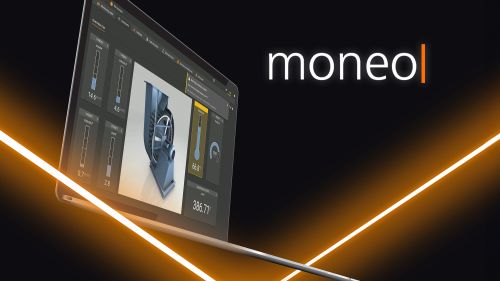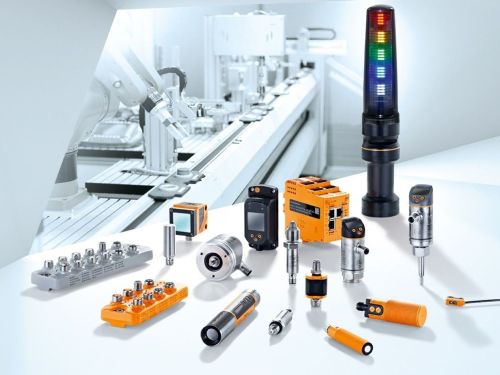Benzinger – Turning and milling machines go digital
Keeping precision machines precise
Benzinger relies on seamless digitalisation solutions from ifm
For more than 100 years, the name Benzinger has been synonymous with high-precision turning and milling machines made in Germany. With around 170 employees at its headquarters in Pforzheim, the mid-sized company serves demanding sectors such as aerospace, hydraulics, toolmaking, and the jewellery industry. Its success is founded on a high degree of in-house manufacturing, modular machine concepts and a holistic perspective.
“We don’t think in terms of machines, but in terms of solutions,” says Steffen Krämer, expert for turning machines at Carl Benzinger GmbH. “Our aim is always to offer the customer the best possible solution.” To achieve this, the company in Pforzheim opts for a very high level of in-house production. From mechanics and electrics to producing components on its own machines, through to assembly, quality assurance and process implementation – Benzinger covers every step under one roof.
Precision and durability built on tradition
This holistic approach is also reflected in the modular design of the machines. Different models can be flexibly adapted to customer requirements and application scenarios. Components such as stroking units, rotary tables or honing modules for the fine finishing of bores are selected to fit precisely and combined into an individual solution. But whether standard or customised – the focus is always on maximum precision.
“Our customers are essentially looking for that last micron of accuracy,” explains Krämer. “We meet this demand for utmost accuracy through a very rigid, durable mechanical design.”
IO-Link: an established industrial standard
In addition to precision and quality, Benzinger is increasingly focusing on digital services and process monitoring. For this, the company relies on sensors and IO-Link solutions from ifm. IO-Link – the open standard for simple bidirectional digital data communication between sensors and actuators – was developed by ifm and other automation specialists and has become firmly established in the industrial environment.
Since its market launch in 2009, more than 50 million nodes of this point-to-point infrastructure have already been installed.
IO-Link offers several advantages that Benzinger can put to profitable use – both internally and for its customers.
“IO-Link gives us many options in mechanical and electrical design that conventional wiring simply cannot offer. Thanks to the decentralised data infrastructure, we can, for example, design more compact overall systems and reduce wiring complexity,” says Krämer.


Image 1: To meet demanding precision requirements, Benzinger relies on a high level of in-house production.
Image 2: Flow sensors like these provide precise insights into the condition of a Benzinger turning machine.
Sensor data is collected efficiently using field-compatible IO-Link masters. As the sensors are wired and connected to the IO-Link master via standardised M12 connectors, wiring errors are ruled out. The IO-Link master then transmits the data in bundled form via fieldbus or Ethernet to the PLC and IT level. This makes the data readily available both for machine control and for evaluation at the IT level without additional effort. As a result, sensor data is no longer used exclusively for process control, but can be converted into valuable information for process analysis and maintenance planning. Benzinger makes use of this capability, for example, when monitoring its spindles.
“We manufacture the spindles ourselves. Thanks to the installed vibration sensors, we receive valuable information about the quality and robustness of the spindles directly from the field.” The insights gained flow directly into the further development of these key components.
Keeping an eye on machine efficiency and health
Another increasingly relevant topic is condition monitoring, which also relies on sensor data to provide precise and continuous insights. “Our customers rely on high machine availability,” says Krämer. To ensure full visibility into the maintenance requirements of the turning and milling machines, the health status of the machines is continuously tracked using a wide range of data: For example, continuous vibration analysis helps to detect signs of unbalance immediately, preventing damage to the machine and reduced part quality. Spindle cooling is monitored using flow sensors. As IO-Link also transmits the temperature of the medium, the effectiveness of spindle cooling can be assessed. Level sensors in the second cooling circuit – used for cooling both tool and workpiece – ensure there is always enough coolant available.
“The energy efficiency of processes is becoming increasingly important for our customers,” says Krämer. “That is why we use compressed air meters to precisely detect the supply to the process. This ensures that compressed air is used as efficiently as possible.” Electrical power, in kilowatts and kilowatt-hours, is also continuously recorded and analysed. An increase in power consumption can serve as an indicator that maintenance may be required.
Data analysis and remote maintenance with the cloud-based IIoT platform ifm moneo
This wealth of information offers valuable insights into machine health. Using ifm’s edgeGateway and LTE bolt, data is transferred to the cloud version of moneo, the automation specialist’s IIoT platform. At Benzinger, most data is transmitted via the IO-Link structure. In addition, the optional data interface ifm Agent makes it possible to connect other data sources,
such as machine controllers or energy meters, to moneo. moneo enables users to collect and analyse machine and system data centrally, and to derive meaningful actions from it. In the cloud version, this can even be done across multiple sites. For example, the vibration behaviour of pumps, motors, spindles and fans can be conveniently monitored to prevent failures caused by bearing damage or unbalance. Process values such as temperature, level, pressure, flow and electrical energy consumption can also be tracked centrally via moneo. If values move outside the defined range, the system automatically alerts the user. More advanced, AI-based data analysis is available with the moneo IIoT-Insights add-on. Thanks to the Remote Connect function, machines can even be serviced remotely via moneo.
“In the moneo cloud environment, customers can see at a glance on the dashboard whether sufficient coolant is available or other maintenance is required,” says Krämer. Not all of Benzinger’s end customers, however, have the staff resources for continuous data analysis and the associated maintenance planning. “That’s why many customers grant us remote access to their machines for maintenance purposes. We then access the machine via the Remote Connect function in moneo to optimise processes in consultation with the customer, or to recommend maintenance measures.”
Control data enhances analysis capabilities
“If, like Benzinger, you also include the data from the machine controller, which can be integrated into moneo via ifm Agent, you obtain a complete picture of the machine’s condition. This ensures the highest possible quality of condition monitoring and at the same time improves the quality of the proactive service offering, which in turn has a positive impact on machine availability and process quality,” says Christoph Schneider, Vice President Product Management at ifm.

From the IO-Link master (centre left) and the evaluation unit for vibration sensors (bottom right), the data is transmitted via the edgeGateway (top right) to the cloud.

Machine data clearly displayed and analysed in the moneo dashboard.
Conclusion
By integrating digitalisation and automation into their production processes, Benzinger has been able to increase efficiency while reducing costs. With state-of-the-art sensor technology and data analysis, potential issues can be detected and addressed early, before they result in major downtime. This not only helps to extend the service life of the machines, but also maximises productivity and profitability for the customers.

